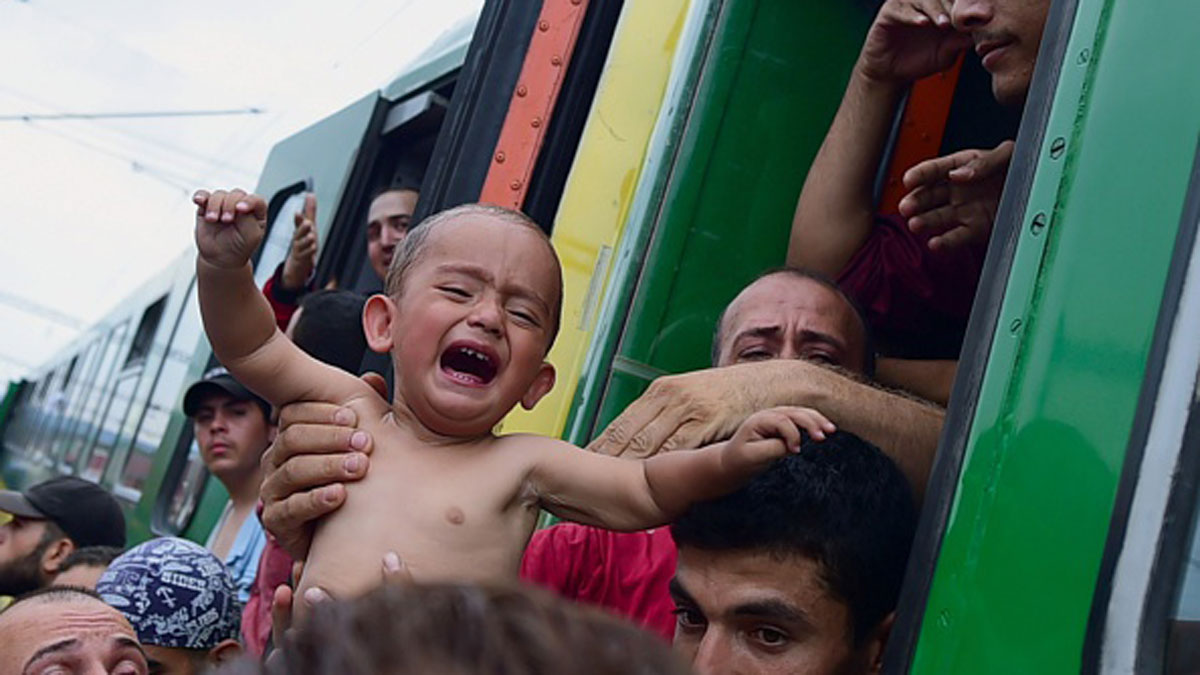Hungary stands accused as refugees are 'fed like cattle'
The government response has been shameful, say observers – but ordinary Hungarians are mobilising

A free daily email with the biggest news stories of the day – and the best features from TheWeek.com
You are now subscribed
Your newsletter sign-up was successful
Hungary has become one of the many flashpoints in the current refugee crisis, and the government has been widely condemned for its response to the humanitarian disaster.
Shocking footage has emerged of migrants and asylum seekers being treated like "cattle in pens" by police in the main refugee camp in Röszke. Journalists are banned from entering and human rights organisations say they are extremely concerned for the welfare of the detainees
Human Rights Watch reports that refugees are detained in filthy, overcrowded conditions, hungry and lacking medical care. "The situation for migrants and asylum seekers in Hungary is inhumane and untenable," says the organisation's Emergencies Director Peter Bouckaert.
The Week
Escape your echo chamber. Get the facts behind the news, plus analysis from multiple perspectives.

Sign up for The Week's Free Newsletters
From our morning news briefing to a weekly Good News Newsletter, get the best of The Week delivered directly to your inbox.
From our morning news briefing to a weekly Good News Newsletter, get the best of The Week delivered directly to your inbox.
The camps have become humiliating holding zones for the thousands trying to cross the country's borders into Germany and Scandinavia, says the BBC's Anna Holligan. "Many of the people I've spoken to, from Raqqa, Idlib and Homs have become numb to violence in Syria, but their treatment in what is supposed to be a place of refuge is hard to bear."
Hungary's response to the refugee crisis has been militaristic. Razorwire fences have been constructed, soldiers deployed to the country's southern border and new laws introduced that could allow the authorities to imprison refugees, prosecute Hungarian citizens for aiding migrants, and give the police and army permission to use force.
Months before the influx began, the government put up billboards declaring: "If you come to Hungary, you cannot take the jobs of Hungarians!" The signs were written in Hungarian, a clear indication that they were not meant for foreigners, says former US ambassador to Hungary, Eleni Kounalakis. "Prime Minister Victor Orban was laying down the groundwork to inoculate the Hungarian public against feeling sympathy for these supposed job-stealers," she argues.
Orban also provoked anger by saying that he didn't want to allow any more Muslims into the country."We do not like the consequences," he said, referring to the country's history of Ottoman rule.
A free daily email with the biggest news stories of the day – and the best features from TheWeek.com
"His hateful statements about Muslims being a threat to "European civilisation," as well as his ludicrous references to century-old wars with the Ottomans, should be called out for what they are: a disgrace," says an editorial in The Guardian.
The Church has been equally unwelcoming, despite Pope Frances urging Catholics to open up their churches, monasteries and homes to those searching for safety. "They're not refugees. This is an invasion," Bishop Laszlo Kiss-Rigo told the Washington Post. "They come here with cries of 'Allahu akbar'. They want to take over."
There is little humanitarian help from established aid agencies, particularly from those affiliated to the Church, so groups of volunteers have stepped in to the fill the void, handing out clothes, food and blankets at the border and at Budapest train station. "You have a good people Hungaria," was written on the walls of Keleti station.
Hungarians have also taken to social media to apologise on behalf of their leaders, reports the Hungarian Free Press. "Sorry for our government, and especially for our prime minister," said one person. "[The volunteers] give all these things selflessly from their own possessions," said another." This is the true Hungary. These are the true Hungarian people."
-
 The broken water companies failing England and Wales
The broken water companies failing England and WalesExplainer With rising bills, deteriorating river health and a lack of investment, regulators face an uphill battle to stabilise the industry
-
 A thrilling foodie city in northern Japan
A thrilling foodie city in northern JapanThe Week Recommends The food scene here is ‘unspoilt’ and ‘fun’
-
 Are AI bots conspiring against us?
Are AI bots conspiring against us?Talking Point Moltbook, the AI social network where humans are banned, may be the tip of the iceberg
-
 Epstein files topple law CEO, roil UK government
Epstein files topple law CEO, roil UK governmentSpeed Read Peter Mandelson, Britain’s former ambassador to the US, is caught up in the scandal
-
 Iran and US prepare to meet after skirmishes
Iran and US prepare to meet after skirmishesSpeed Read The incident comes amid heightened tensions in the Middle East
-
 Israel retrieves final hostage’s body from Gaza
Israel retrieves final hostage’s body from GazaSpeed Read The 24-year-old police officer was killed during the initial Hamas attack
-
 China’s Xi targets top general in growing purge
China’s Xi targets top general in growing purgeSpeed Read Zhang Youxia is being investigated over ‘grave violations’ of the law
-
 Panama and Canada are negotiating over a crucial copper mine
Panama and Canada are negotiating over a crucial copper mineIn the Spotlight Panama is set to make a final decision on the mine this summer
-
 Why Greenland’s natural resources are nearly impossible to mine
Why Greenland’s natural resources are nearly impossible to mineThe Explainer The country’s natural landscape makes the task extremely difficult
-
 Iran cuts internet as protests escalate
Iran cuts internet as protests escalateSpeed Reada Government buildings across the country have been set on fire
-
 US nabs ‘shadow’ tanker claimed by Russia
US nabs ‘shadow’ tanker claimed by RussiaSpeed Read The ship was one of two vessels seized by the US military